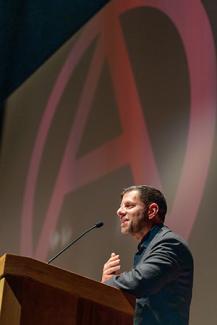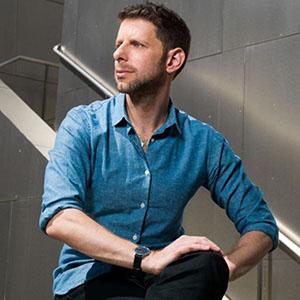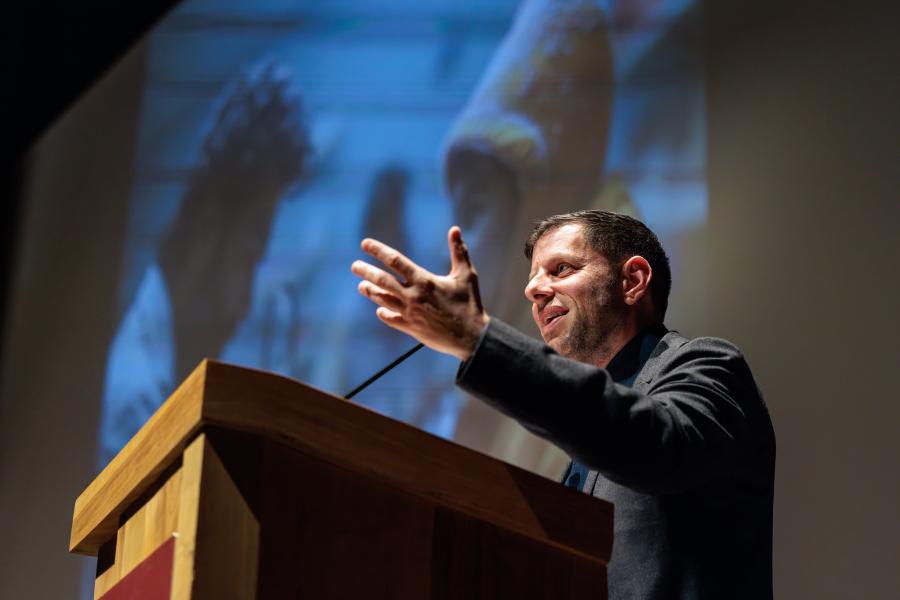Visionary opera director Yuval Sharon presented the 2025 Randy L. and Melvin R. Berlin Family Lectures on May 6, 13, and 20, which consisted of three public lectures and a special performance of John Cage’s Europera 5.
Lecture 1: "Anarchy at the Opera" - May 6, 2025
Lecture 2: "Burn Down the Opera Houses!" - May 13, 2025
Lecture 3: “John Cage's Joyous Anarchy” and Performance of John Cage’s Europera 5 - May 20, 2025
About Anarchy at the Opera

Picking up on a line from his new book, A New Philosophy of Opera (2024), director Yuval Sharon explores the question under his theme of "Anarchy at the Opera": Is opera a standard bearer or a pall bearer for the status quo?
Anarchy, as a much-maligned political ideology, offers a provocative and generative way to consider an evolution for the art form of opera as a critique of the status quo. These lectures explore both historic experiments in non-hierarchical creation—John Cage’s Europeras and the history of improvisation in opera—as well as Sharon’s own practical experiences with “anarchic” opera.
Yuval Sharon is an innovative director of opera with a vision for transforming opera from its status quo into an imaginative, non-elite form of art. He upends tradition by setting operas in unexpected public spaces such as parking lots, amplifying the human voices, and sometimes performing classic operas in reverse order. Sharon is the founder and co-Artistic Director of The Industry in Los Angeles and the Gary L. Wasserman Artistic Director of the Detroit Opera.
Watch Lecture 1 "Anarchy at the Opera"
Watch Lecture 2 "Burn Down the Opera Houses!"
Watch Lecture 3 "John Cage's Joyous Anarchy"
John Cage's Europera 5 directed by Yuval Sharon
About Yuval Sharon

As he wrote in his first book, A New Philosophy of Opera (2024), “Let’s start thinking of opera as evolutionary rather than decaying. Let’s consider the experience of going to the opera as a way of thinking and feeling that will benefit us outside the theater. Let’s start viewing opera as an engine for empathy and awe, and decide to attend a performance with an explorer’s mindset. That means opening ourselves up to the unfamiliar. What would happen if we approached opera on those terms, actively developing our curiosity about things we can’t fathom but long to know?”
Visiting Fellow at the University of Chicago
During this time at UChicago, Sharon was the inaugural Global Solutions Visiting Fellow at UChicago’s Neubauer Collegium. His fellowship enabled him to develop concepts for upcoming projects through collaboration with research partners at UChicago. The Neubauer Collegium’s distinct approach to scholarship, which integrates and expands the horizons of the visual and performing arts, makes it an ideal laboratory for Sharon’s work as an innovator in the highly collaborative world of opera.
His fellowship at the Neubauer has allowed Sharon “to explore ideas and think about alternatives in a way that makes the ideation process richer, deeper, and more thoughtful than it would be if we were just racing to a design deadline,” he said.
Among his many honors, Sharon received the 2014 Götz Friedrich Prize in Germany for his production of John Adams’s Doctor Atomic, a MacArthur Fellowship in 2017, and Musical America's Director of the Year in 2023. He has been a Global Fellow at the University of Chicago’s Neubauer Collegium since 2023. Sharon has successfully defied expectations and expanded the horizons of opera in performances like Christopher Cerrone’s Invisible Cities, set in Union Station of Los Angeles; Hopscotch, an opera staged in 24 moving vehicles; and The Comet/Poppea, where a constantly rotating stage juxtaposed simultaneous performances of Monteverdi’s L’incoronazione di Poppea and a new opera adaptation of W.E.B. DuBois’s The Comet by George Lewis and Douglas Kearney. He was the first American to direct at Richard Wagner's Bayreuth Festival with a production of Lohengrin in 2018.
Q&A with Yuval Sharon
In this Q&A, the opera director discusses the present and future of opera, his ongoing relationship with UChicago, and how his latest book, A New Philosophy of Opera, has informed his upcoming Berlin Family Lectures and performance.
Much of your work challenges the status quo—spatially, narratively, even logistically. What kinds of risks have yielded the most surprising or meaningful artistic results for you?
The most meaningful artistic results I’ve experienced in my work are from the times I’ve taken opera outside the opera house, performing it in parks, parking garages or in moving vehicles. These projects beyond the proscenium arch of the theater became the most visceral ways to remind audiences of their participatory power in a performance. The normal rules that dictate the relationship between artist and spectator are called into question once that architectural separation is lifted, and I find the exploration that becomes possible in that space truly exciting.
How do you balance honoring the traditions of opera while pushing boundaries to explore new ideas?
This is one of the constant tensions for interpreters in any medium, although in opera, audiences are still becoming aware of the interpretative potential of the visual aspects of the art form. I still find myself explaining to audiences why a director has the license to change seemingly fixed elements of the narrative (and this is a major element of my book A New Philosophy of Opera). Theater does not have that same challenge with its public; how often do you hear calls for Shakespeare to be performed exclusively in tights? But I feel opera audiences are becoming more open to the creative license of directors and designers in connecting older texts with contemporary aesthetics and values.
Each and every project is its own balancing act between tradition and innovation; what works well for one composer, or one composition, or one community, may not necessarily work when transposed into another situation. You have to approach each work on its own terms, making each production (to paraphrase the director Wieland Wagner) a journey to an unknown destination.
How do you hope your work is influencing not just how opera is made today, but how institutions think about the future of productions, sustainability and audience relationships?
This is a central preoccupation in serving as an artistic director, a different role than when I am “merely” the artist. As artistic director, I am articulating the values of the institution as they unfold both in an artwork and in the making of that artwork. We have a fallacious view of opera as monolithic and hierarchical, when it is the most ridiculously collaborative art form that humans have yet come up with. As artistic director, I can create the conditions for every voice to maintain some of its autonomy, not simply be subsumed in my vision. That is one of the main topics of my upcoming lectures: an “anarchic” organization of artists feels to me an aspiration for opera, perhaps best encapsulated in the work of John Cage.
How has your time as a Global Solutions Visiting Fellow at UChicago’s Neubauer Collegium contributed to your current work and your ongoing thinking about the history, theory and practice of opera?
It has been an enormous privilege to have the support of the Neubauer Collegium in the making of several projects. Their support of my production of Mozart’s Cosi fan tutte has helped me delve deep into the development of artificial intelligence and consider its philosophical underpinnings. They are currently creating a wonderful “home base” for the research and development of my Ring cycle for the Metropolitan Opera. But most importantly, they have plugged me in to the incredible community of the university and put me in touch with the world of ideas flourishing here, which has been an invigorating experience for me!
What should audiences know about your upcoming lectures “Anarchy at the Opera”? And why did you choose John Cage’s Europera 5 as the closing performance?
John Cage’s Europera cycle has had a formidable influence on my thinking around opera, and it embodies the idea of a “friendly anarchy” (or, as I like to call it, a joyful chaos). It offers a perfect encapsulation of the themes of my talks, so it has the potential to offer listeners a direct experience of those ideas in practice. I don’t feel I can just talk about opera for three lectures without also offering listeners a glimpse into what it is in practice! Plus, it gives me the satisfaction of having directed all five of the pieces in Cage’s cycle of works!

